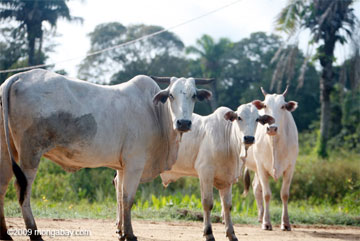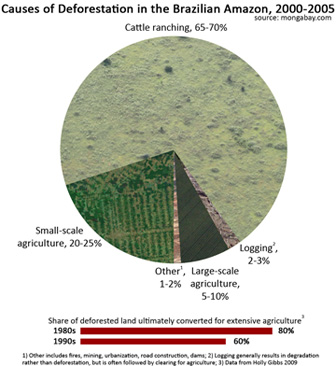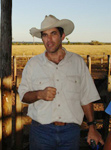Walmart mandates zero deforestation in beef, palm oil sourcing
The world’s largest retailer last week announced new sourcing criteria for commodities closely associated with deforestation: palm oil and beef from the Amazon.
Walmart will require sustainably-sourced palm oil for all its private brand products globally by the end of 2015, a move that will provide critical support for initiatives to reduce the environmental impact of palm oil, which has at times been produced at the expense of tropical rainforests in Indonesia and Malaysia. Walmart says the move will reduce greenhouse gas emissions by 5 million metric tons by the end of 2015 for its U.K. and U.S. private brand products alone.

|
The retail giant also said it will expand Walmart Brazil’s beef sourcing practices to all Walmart companies worldwide by the end of 2015. Walmart Brazil has pioneered a traceability system to ensure that beef does not contribute to Amazon deforestation. Cattle production accounts for 60-80 percent of all deforestation in the Brazilian Amazon.
Walmart Brazil’s beef traceability program, known as “Selected Quality, Guaranteed Origin”, allows a consumer, using a cell phone, to track the origin of beef products in the store all the way back to its source ranch.
“The aim of this program is to help out customers choose more sustainable products at a high quality and the best value,” Luiz Carlos Paschoal of Walmart Brazil, said in a video explaining the traceability program.
“We are committed to Amazon conservation and since 2005 we have been working with our suppliers, academics, NGOs and the government to build a more sustainable and transparent supply chain,” added Jose Rafael Vasquez, chief merchandising manager Walmart Brazil. “We want to provide our customers with complete and detailed information about the beef they buy in our stores.”

|
“The project is very important to us and we hope it will be a catalyst to change the beef industry in Brazil.”
Walmart says it intends to expand the number of products with this level of traceability and transparency. In the Amazon, Walmart Brazil has committed to sustainable sourcing of timber and soy as well as safeguards to ensure that suppliers are not engaged in abusive labor practices.
Earlier this year Walmart committed to reducing 20 million metric tons of CO2 emissions from its private label products and supply chain by the end of 2015.
Deforestation is a larger source of greenhouse gas emissions than all the world’s cars, trucks, trains, ships, and planes combined. Slowing or stopping deforestation represents one of the most cost effective ways to reduce emissions, according to analysis by McKinsey & Company, a consultancy.
Concerns over deforestation may drive new approach to cattle ranching in the Amazon

(09/08/2009) While you’re browsing the mall for running shoes, the Amazon rainforest is probably the farthest thing from your mind. Perhaps it shouldn’t be. The globalization of commodity supply chains has created links between consumer products and distant ecosystems like the Amazon. Shoes sold in downtown Manhattan may have been assembled in Vietnam using leather supplied from a Brazilian processor that subcontracted to a rancher in the Amazon. But while demand for these products is currently driving environmental degradation, this connection may also hold the key to slowing the destruction of Earth’s largest rainforest.
Can cattle ranchers and soy farmers save the Amazon?

(06/06/2007) John Cain Carter, a Texas rancher who moved to the heart of the Amazon 11 years ago and founded what is perhaps the most innovative organization working in the Amazon, Alianca da Terra, believes the only way to save the Amazon is through the market. Carter says that by giving producers incentives to reduce their impact on the forest, the market can succeed where conservation efforts have failed. What is most remarkable about Alianca’s system is that it has the potential to be applied to any commodity anywhere in the world. That means palm oil in Borneo could be certified just as easily as sugar cane in Brazil or sheep in New Zealand. By addressing the supply chain, tracing agricultural products back to the specific fields where they were produced, the system offers perhaps the best market-based solution to combating deforestation. Combining these approaches with large-scale land conservation and scientific research offers what may be the best hope for saving the Amazon.
Globalization could save the Amazon rainforest

(06/03/2007) The Amazon basin is home to the world’s largest rainforest, an ecosystem that supports perhaps 30 percent of the world’s terrestrial species, stores vast amounts of carbon, and exerts considerable influence on global weather patterns and climate. Few would dispute that it is one of the planet’s most important landscapes. Despite its scale, the Amazon is also one of the fastest changing ecosystems, largely as a result of human activities, including deforestation, forest fires, and, increasingly, climate change. Few people understand these impacts better than Dr. Daniel Nepstad, one of the world’s foremost experts on the Amazon rainforest. Now head of the Woods Hole Research Center’s Amazon program in Belem, Brazil, Nepstad has spent more than 23 years in the Amazon, studying subjects ranging from forest fires and forest management policy to sustainable development. Nepstad says the Amazon is presently at a point unlike any he’s ever seen, one where there are unparalleled risks and opportunities. While he’s hopeful about some of the trends, he knows the Amazon faces difficult and immediate challenges.














